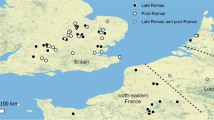Abstract
Accounts of Southwest Asian pastoralism often suggest that wealth in animals is volatile. However, no systematic study has been undertaken to determine either the potential for herd increase and loss or the likely long-term implications of this potential. Drawing on an analysis of data from the Komachi nomads of south-central Iran and other Southwest Asian pastoralists, this paper addresses these questions. It argues that, contrary to conventional expectations, (a) herds in the region do not show potential for dramatic increase; (b) radical shifts in individual economic status are unlikely to occur through normal gains and losses; and (c) to the extent that short-term gains or losses of individual holdings do occur, long-term economic differentiation within a population can be expected.
Similar content being viewed by others
References
Asad, T. (1979). Equality in nomadic systems? Notes toward the dissolution of an anthropological category. In Equipe Écologie et Anthropologie (eds.),Pastoral Production and Society, Cambridge Univ. Press, Cambridge, England.
Barth, F. (1961).Nomads of South Persia. Little, Brown, Boston.
Barth, F. (1964). Capital, investment and the social structure of a pastoral nomad group in South Persia. In Firth, R., and Yamey, B. S. (eds.),Capital, Saving and Credit in Peasant Societies, Aldine, Chicago, pp. 69–81.
Barth, F. (1973). A general perspective on nomad-settled relations in the Middle East. In Nelson, C. (ed.),The Desert and the Sown, Univ. California Inst. Internat. Studies, Berkely, Calif.
Bates, D. (1973).Nomads and Farmers: A Study of the Yörük of Southeastern Turkey. Univ. Michigan Museum Anthropol., Ann Arbor.
Baxter, P. T. W. (1975). Some consequences of settlement for social relationship. In Monod, Th. (ed.),Pastoralism in Tropical Africa, Oxford Univ. Press, London.
Black, J. (1972). Tyranny as a strategy for survival in an egalitarian society: Luri facts versus an anthropological mystique.Man (NS) 7: 614–634.
Black, J. (1973). Correspondence.Man (NS) 8: 111–112.
Black, J. (1976). The Economics of Oppression: Ecology and Stratification in an Iranian Tribal Society. Unpublished PhD thesis, Univ. London.
Bradburd, D. (1980). Never give a shepherd an even break: Class and labor among the Komachi.American Ethnologist 7(4): 603–620.
Burnham, P. (1979). Spatial mobility and political centralization in pastoral societies. In Equipe Ecologie et Anthropologie (eds.),Pastoral Production and Society, Cambridge Univ. Press, Cambridge, England.
Dahl, (1979a). Ecology and equality: The Boran Case. In Equipe Ecologie et Anthropologie (eds.),Pastoral Production and Society, Cambridge Univ. Press, Cambridge, England, pp. 261–282.
Dahl, G. (1979b).Suffering Grass. Stockholm Studies in Social Anthropology, No. 8, Dep. Social Anthropol., Univ. Stockholm, Stockholm.
Dyson-Hudson, R. (1980). Toward a general theory of pastoralism and social stratification.Nomadic Peoples 7: 1–7.
Goldschmidt, W. (1979). A general model for pastoral social systems. In Equipe Écologie et Anthropologie (eds.),Pastoral Production and Society, Cambridge Univ. Press, Cambridge, England, pp. 15–28.
Hjort, A. and Dahl, G. (1976).Having Herds, Pastoral Growth and Household Economy. Stockholm Studies in Social Anthropology, No. 2, Dep. Social Anthropol. Univ. Stockholm.
Huntington, H. (1972). The rate of return from the Basseri's livestock investment.Man (NS)7: 476–479.
Irons, W. (1972). Variation in economic organization: A comparison of the pastoral Yomut and the Basseri. In Irons, W., and Dyson-Hudson, N. (eds.),Perspectives on Nomadism, E. J. Brill, Leiden.
Irons, W. (1975).The Yomut Turkmen: A Study of Social Organization among a Central Asian Turkic Speaking Population. Univ. Michigan Museum Anthropol., Ann Arbor, Mich.
Irons, W. (1979). Political stratification among pastoral nomads. In Equipe Écologie et Anthropologie (eds.),Pastoral Production and Society, Cambridge Univ. Press, Cambridge, England, pp. 361–374.
Lefébure, C. (1979). Introduction: The specificity of nomadic pastoral societies, In Equipe Écologie et Anthropologie (eds.),Pastoral Production and Society, Cambridge Univ. Press, Cambridge, England, pp. 1–14.
Mansfield, E. (1962). Entry, Gibrat's Law and the growth of firms.American Economic Review 52: 1031–1034.
Murphy, R. (1970). Basin ethnography and ecological theory. In Swanson, E. (ed.),Languages and Cultures of Western North America, Idaho State Univ. Press, Pocatello, Idaho.
Salzman, P. C. (1979). Inequality and oppression in nomadic society. In Equipe Écologie et Anthropologie (eds.),Pastoral Production and Society, Cambridge Univ. Press, Cambridge, England, pp. 429–446.
Salzman, P. C. (1980). Processes of settlement among the nomads of Baluchistan. In Salzman, P. C. (ed.),When Nomads Settle, Bergin, New York.
Scherer, F. M. (1970).Industrial Market Structure and Economic Performance, 1st Ed. Rand-McNally, Chicago.
Schneider, H. K. (1979).Livestock and Equality in East Africa. Indiana Univ. Press, Bloomington, Ind.
Sweet, L. (1970). Camel raiding of North Arabian Bedouin: A mechanism of ecological adaptation. In Sweet, L. (ed.),Peoples and Cultures of the Middle East, Natural History Press, Garden City, New York.
Swidler, W. (1973). Adaptive processes regulating nomad-sedentary interaction in the Middle East. In Nelson, C. (ed.),The Desert and the Sown, Univ. California Inst. Internat. Studies, Berkeley, Calif.
Tapper, R. (1979).Pasture and Politics. Academic Press, London.
Author information
Authors and Affiliations
Rights and permissions
About this article
Cite this article
Bradburd, D. Volatility of animal wealth among Southwest Asian pastoralists. Hum Ecol 10, 85–106 (1982). https://doi.org/10.1007/BF01531106
Issue Date:
DOI: https://doi.org/10.1007/BF01531106




